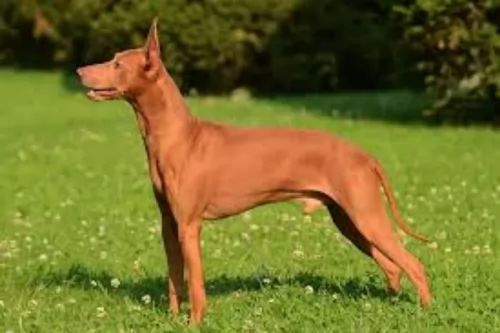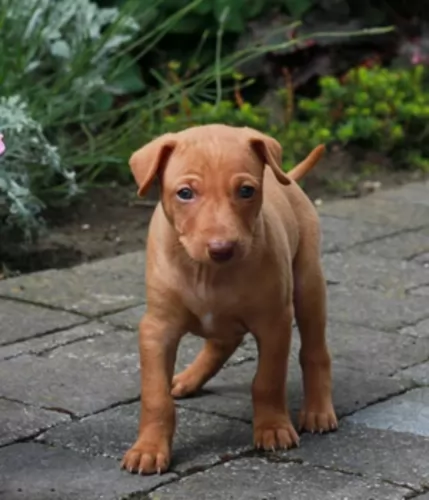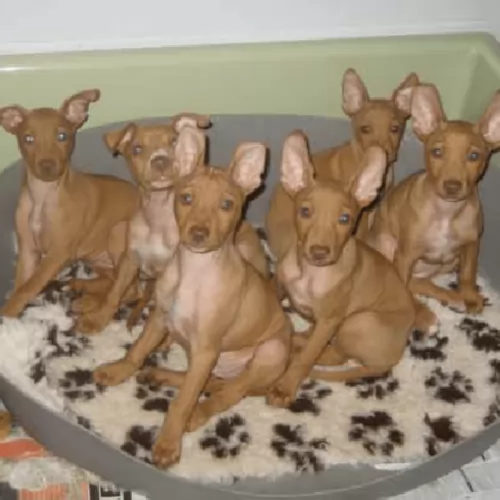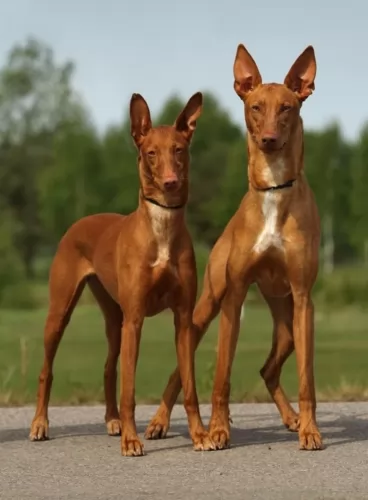 Petzlover
Petzlover Cirneco dell'Etna is originated from Italy but Latvian Hound is originated from Russia. Both Cirneco dell'Etna and Latvian Hound are having almost same height. Cirneco dell'Etna may weigh 8 kg / 17 pounds lesser than Latvian Hound. Both Cirneco dell'Etna and Latvian Hound has almost same life span. Both Cirneco dell'Etna and Latvian Hound has almost same litter size. Cirneco dell'Etna requires Moderate Maintenance. But Latvian Hound requires Low Maintenance
Cirneco dell'Etna is originated from Italy but Latvian Hound is originated from Russia. Both Cirneco dell'Etna and Latvian Hound are having almost same height. Cirneco dell'Etna may weigh 8 kg / 17 pounds lesser than Latvian Hound. Both Cirneco dell'Etna and Latvian Hound has almost same life span. Both Cirneco dell'Etna and Latvian Hound has almost same litter size. Cirneco dell'Etna requires Moderate Maintenance. But Latvian Hound requires Low Maintenance
 The Cirneco dell’Etna comes from the island of Sicily and not mainland Italy, although it is considered an Italian dog. It is a small dog that hunted rabbits and its calling card was its ability to go for hours without water or food. They have terrific endurance and a good sense of smell. They were developed for the harsh terrain they worked around places like Mount Etna. Of all the Mediterranean island hunting dogs, the Cirneco de’Etna is the smallest.
The Cirneco dell’Etna comes from the island of Sicily and not mainland Italy, although it is considered an Italian dog. It is a small dog that hunted rabbits and its calling card was its ability to go for hours without water or food. They have terrific endurance and a good sense of smell. They were developed for the harsh terrain they worked around places like Mount Etna. Of all the Mediterranean island hunting dogs, the Cirneco de’Etna is the smallest.
This is a very ancient breed, surviving on its hunting skills alone for thousands of years on Sicily. They then became guard dogs for the peasants. Because they had such speed, sense of smell, alertness and sight, they were great hunters.
Today’s Cirneco de’Etna is highly competitive in confirmation and make terrific pets. They are exceedingly friendly, energetic and low maintenance. Lure coursing is what they really excel at. They are good at agility and pursuit games as well.
 The Latvian Hound is a medium sized Russian or Latvian hunting hound. The dog was bred in Latvia, Russia.
The Latvian Hound is a medium sized Russian or Latvian hunting hound. The dog was bred in Latvia, Russia.
He was developed from a number of English and Polish dogs as well as Lucernese breeds.
It is by no means a new breed and records of it go way back to the 1600s. A certain Duke Courland developed the dog so that it was also known as the Courland Hound. In 1922 the Latvian Association of Hunters' Associations was formed.
It was in 1971 that the Latvian Hound was was approved with it's name and a new standard was developed and approved. It isn't recognized by the AKC or the FCI.
 The Cirneco de’Etna is a sleek, muscular sighthound. His ears are close together and high on his head. The head is lean, and the skull is almost flat in profile. The muzzle is about the same length as the skull and the nose is large and its coloring matches the dog’s coat. They have hard pads the same color as their nails, but they are never black.
The Cirneco de’Etna is a sleek, muscular sighthound. His ears are close together and high on his head. The head is lean, and the skull is almost flat in profile. The muzzle is about the same length as the skull and the nose is large and its coloring matches the dog’s coat. They have hard pads the same color as their nails, but they are never black.
 The Latvian Hound is a medium sized dog standing at between 40 to 48cm in height and weighing about 15 to 20kg.
The Latvian Hound is a medium sized dog standing at between 40 to 48cm in height and weighing about 15 to 20kg.
He has a deep chest, fairly long, floppy ears, a long tail with strong legs. The coat is double and is short, shiny and dense. He is an average shedder. He is essentially black with tan markings, with tan spots above the eyes. The eyes are dark brown and the nose is black.
The Latvian Hound may well be an exceptional hunter but he also makes a great family pet. He is looked upon as being a friendly, amicable, sweet dog.
Because he has been a working dog, he likes to be busy and will happily join in with all your hikes and swimming. He will also run with you while you cycle.
It’s a dog that doesn’t like to be left alone for long periods of time, being inclined to suffer with separation anxiety. He doesn’t take kindly to strangers either, but a dog which has been socialized and trained becomes more amicable.
Your Latvian is intelligent so you won’t have any trouble teaching him some simply commands. He is a friendly, lively dog and just having him in your home brings in a joyous atmosphere. He is an easy-going dog, but even so, if you don’t have a fair sized garden and you don’t have the time to exercise him, he is better off living on a farm or where there is a fair sized garden.
 The Latvian Hound is an outgoing, fun dog to have around and a great dog for first-time dog owners too. He has always been a working dog, so he has developed skills such as being focused and tenacious.
The Latvian Hound is an outgoing, fun dog to have around and a great dog for first-time dog owners too. He has always been a working dog, so he has developed skills such as being focused and tenacious.
As a companion and family dog, you will have a true friend as he is sweet, loving and loyal and thrives on the attention of his human family. He is a playful dog, feisty and energetic, and will be protective too. Bring him into your home and you'll see what a bright place it becomes just having him there as pet and friend.
 Like many dogs that come from ancient breeds with little cross breeding over the years, there are not a lot of inherited issues for the Cirneco de’Etna. Also, there are so few dogs remaining that little is known about their health in general and there are no studies to go on. Some breeders will do test despite the fact that none are recommended.
Like many dogs that come from ancient breeds with little cross breeding over the years, there are not a lot of inherited issues for the Cirneco de’Etna. Also, there are so few dogs remaining that little is known about their health in general and there are no studies to go on. Some breeders will do test despite the fact that none are recommended.
Their most common health issues are acquired such as injuries from running or competitions and obesity. Both can be controlled by the owner.
 The life span of the Latvian Hound is 12 to 14 years, and while there are no reported major health issues, all dogs face some kind of medical issues during their lives. The Latvian Hound can face things like hip dysplasia, eye problems, bloat and ear infections.
The life span of the Latvian Hound is 12 to 14 years, and while there are no reported major health issues, all dogs face some kind of medical issues during their lives. The Latvian Hound can face things like hip dysplasia, eye problems, bloat and ear infections.
Vaccines can protect your dog from contracting some illnesses which can be fatal.
There is controversy over pet vaccines but the problem is more about HOW the dog is vaccinated.
There was a time when puppies were vaccinated many times, but newer guidelines were updated in 2017, stating that core vaccines be given to adult dogs in intervals of 3 years or more, rather than every year.
Puppy vaccines still need to be done about every 3 weeks between the ages of 6 and 16 weeks against the likes of parvovirus and distemper. Get yourself a good vet who is skilled and safe with vaccines.
 The Cirneco needs a good quality food since they are such high energy dogs. Be careful not to overfeed them so that they become obese.
The Cirneco needs a good quality food since they are such high energy dogs. Be careful not to overfeed them so that they become obese.
As previously mentioned, the main concern for owners is injuries acquired while on a running course or in the activities of daily living. They have been known to hurt their feet. They need their ears checked regularly for any signs of infection or irritation. Clean out any excess water or dirt.
This is an intelligent, hardy breed that needs mental and physical stimulation. They need a job, or they can be a major problem. They love hunting of course but also excel at agility, lure crossing, and competition. He is loyal and loves being with people. Take him for long walks but don’t let him off the leash.
 The Latvian Hound has a short coat that is easy to groom. He is a moderate shedder and brushing him twice a week will take care of all that loose hair. He’ll thrive on the attention this grooming session gives him and its the time to check him over for ticks and fleas too.
The Latvian Hound has a short coat that is easy to groom. He is a moderate shedder and brushing him twice a week will take care of all that loose hair. He’ll thrive on the attention this grooming session gives him and its the time to check him over for ticks and fleas too.
Check the inside of his ears. Without even realizing it, dirt and wax can build up and result in an ear infection. His ear may be red and you’ll notice him shaking his head and scratching at his ears. Be very careful about cleaning his ears as going to deep can damage the ear.
Any grooming of your dog that you can’t manage can be attended to by professional dog groomers.